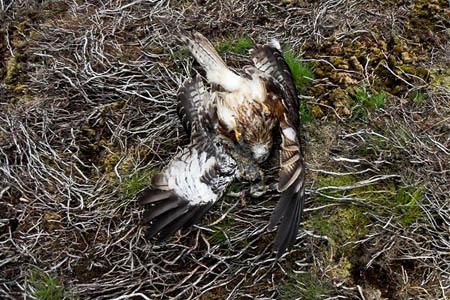Police are investigating the death of a protected bird of prey after tests proved the raptor was poisoned.
The red kite was found by a fieldworker monitoring the birds on Lofthouse Moor in North Yorkshire.
The bird was near a cattle grid at the Nidderdale site, an area of outstanding natural beauty.
North Yorkshire Police said the bird had been dead for a few days and appeared to have been feeding on a baby rabbit at the time of its death.
The fieldworker alerted officers who suspected that the bird had been poisoned.
Natural England sent the bird for a post mortem at the Veterinary Laboratory Agency in Thirsk, but an obvious cause of death could not be found.
Further samples were sent to the Food and Environment Agency at Sand Hutton, near York, where toxicology tests established that the ride kite had been poisoned by a combination of banned pesticides.
The toxicology tests also revealed that the bird had eaten rodents which had been poisoned using commonly available rat and mouse poison.
PC Gareth Jones, a wildlife officer for North Yorkshire Police, who is investigating the incident, said: “The use of rat and mouse poison is a common problem which puts the lives of red kites and other birds of prey in danger.
“It is the responsibility of anyone who puts down poison to control rats and mice, to collect the dead rodents and dispose of them properly.
“It is a great shame that another red kite has been killed in North Yorkshire particularly as they are an endangered species and have only recently returned to the county.
“These birds should be cherished and North Yorkshire Police’s wildlife crime unit takes this kind of incident extremely seriously.
“If anyone has any information about this incident or any other bird of prey persecution, please contact the police or Crimestoppers as soon as possible.”
Anyone with information is asked to contact North Yorkshire Police on 101 and select option 2, then ask for Gareth Jones or Ripon police.
Alternatively, Crimestoppers can be contacted anonymously on 0800 555 111.
The Royal Society for the Protection of Birds also has a confidential reporting line 0845 466 3636.

ian
14 August 2012very sad, but perhaps all we can expect until landowners are jailed for this type of behavior.